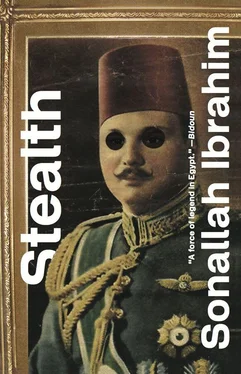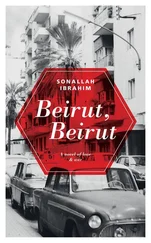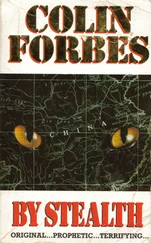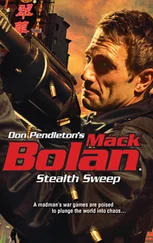The children run underneath their hovering kites. They move out of my sight. I go back to the desk. I review the lesson on lengths of measure and use of the compass and ruler. The cry rings out in the alley: “Knife blades and scissors!” I rush back to the balcony. The man is in the middle of the alley behind his sharpener. Samir brings him a lot of knives. He pushes the wheel with his hand to get it spinning. He puts the edge of the blade against it. Sparks come flying off. He grips the handle and moves it sideways to its tip. He lifts it and puts the other side on the wheel. Abdel Hamid shows up, coming from the entrance to the alley. He walks along seriously until he gets to the door of the house. We pass out of the big iron gate. My father clutches a bag of apples to his chest. We walk over a long, dusty path with dead trees on either side. We come to a one-story house. Nurses with huge bodies. One comes to us wearing a long metal chain around her waist. It drags behind her on the bare tiles. Her cracked sandals scrape against the floor. Their heels are striped with black cracks. A long hallway with rows of shut doors on both sides. Some of them have iron doorknobs. Behind them are women wearing strange looks. One of them laughs with loud peals of laughter. She points to a woman who is pale and fat with a face full of pimples, whispering: “Come here.” I grab hold of my father’s hand. An open hall with many beds. Mother is lying on one. She smiles quietly. My father holds the bag of apples out to her. She takes one of them. She wipes it off with her hand and nibbles at its side. She feels my face with her fingers. She asks me about school but doesn’t seem to care. The huge nurse watches us from close by, keeping her eyes on the apples.
His fingers make it to the middle beads on the string. I open the satchel. I get out the marbles that I still have. I am careful to keep all the same kind. Most of them are shaped like balls and are transparent with twisting stripes inside of all different colors. I pick out four that are different shapes and sizes. I put them to one side to change them during the game.
His fingers come close to the end of the string. I put the satchel to the side. I open the composition notebook. I write the word “Reading” in the middle of the line. I think, then I skip a line and write in big letters: “Reading and the Comprehension of the Reading.” It fills up the line. I skip another one and go to the line after that. I stop because I can’t think of what else to write.
I wait until he finishes the string. Unsure, I go close to him carrying the draft notebook and fountain pen. He always writes my compositions for me and then I put them in my own handwriting. I look up at his smooth-shaven cheek. He takes the notebook from me.
He says: “Hand me a pencil.”
My thanks to the poet Hamza Qanawy for the help he offered in working with and reviewing the original Arabic manuscript at various stages.
Translator’s acknowledgments and note
Sonallah Ibrahim was an engaged and insightful participant in this English version of his novel, and I thank him for his help. Thanks also to Mohamed Aboul-Ela, Richard Bartlett, Ayman El-Desouky, Sayyid Fathi, Jennifer Grotz, Ahmad Hassan, and Richard Jacquemond, each of whom helped me at various stages and in diverse ways. In translating quotations from the Quran, I have referred to Michael Sells, Approaching the Qur’án: The Early Revelations, Ashland, Oregon, 2001, and Al-Qur’án: A Contemporary Translation, by Ahmed Ali, Princeton, 1993.












